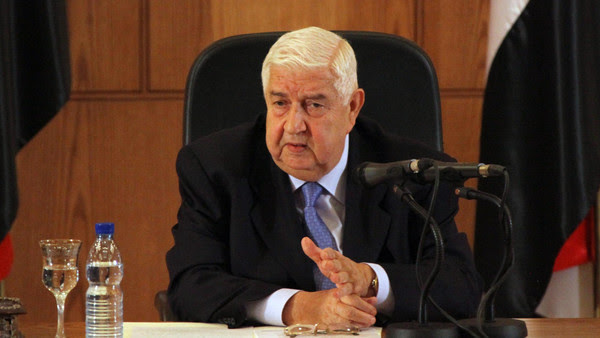
Syria said on Monday that it is “ready” to work with the United States and other world powers in fighting “terrorism,” as its ally Russia urged Western and Arab governments to overcome their distaste for President Bashar al-Assad.
The White House did not directly respond to Moallem’s comments and said U.S. President Barack Obama had so far made no decision on whether to launch air strikes on militant group the Islamic State of Iraq and Syria (ISIS).
“Syria is ready for cooperation and coordination at the regional and international level to fight terrorism and implement U.N. Security Council resolution 2170,” Syrian Foreign Minister Walid al-Moallem told reporters in Damascus.
He confirmed, in response to a question, that the country’s willingness to do so would extend to cooperating with the United States and Britain. “They are welcome,” he said.
Moallem added that Syria was willing to participate in such efforts as part of a regional or international coalition, or on the basis of bilateral cooperation.
But, he said, “We must feel that the cooperation is serious and not double standards.”
“Any violation of Syria’s sovereignty would be an act of aggression.”
His comments come as ISIS advances in several parts of Syria, including Raqqa province, where it seized the army’s last provincial outpost on Sunday.
Moallem’s statements also came shortly after Russian Foreign Minister Sergei Lavrov urged Western and Arab governments to overcome their distaste for Syrian President Assad and engage with him to fight ISIS insurgents.
In comments likely to irritate Washington, Lavrov said the United States had made the same mistake with ISIS as it had with Al-Qaeda, which emerged in the 1980s when U.S.-backed Islamist insurgents were fighting the Soviet occupation of Afghanistan.
“I think Western politicians are already realizing the growing and fast-spreading threat of terrorism,” Lavrov said, referring to ISIIS advances in Syria and Iraq.
“And they will soon have to choose what is more important: a (Syrian) regime change to satisfy personal antipathies, risking deterioration of the situation beyond any control, or finding pragmatic ways to unite efforts against the common threat.”
Russia has been Assad’s most prominent international backer in the civil war that broke out in early 2011 and in which the United States and the West, as well as many Gulf and Arab states, backed the rebels seeking to oust him.
“At the start the Americans and some Europeans rather welcomed (Islamic State) on the basis it was fighting against Bashar al-Assad. They welcomed it as they welcomed the mujahideen who later created al Qaeda, and then al Qaeda struck like a boomerang on Sept. 11, 2001,” Lavrov said.
“The same thing is happening now,” he said, adding that the United States had only started fighting the group after it began rampaging across Iraq and approaching the capital Baghdad.
The White House said Monday that Obama had so far made no decision on whether to launch air strikes on Islamic State militants in Syria.
“The president has not made any decision to conduct military action in Syria,” White House spokesman Josh Earnest said, amid rising expectations of U.S. action following American attacks against the militant group in Iraq.
Earnest addressed reports that the Pentagon has been preparing options for U.S. military action in Syria, saying it was the job of the U.S. military headquarters to plan for all kinds of scenarios.
“The president has not made any decision to order military action in Syria,” Earnest said, before the president was due to meet Defense Secretary Chuck Hagel on issues including the situation in Iraq and the threat from ISIS.
Earnest did not directly respond to a comment by Assad’s regime in Syria that it was willing to work with the United States to take on “terrorism” inside Syria, in a reference to ISIS forces opposed by both Washington and Damascus.
Washington has repeatedly demanded Assad leave power and accused him of gross violations of human rights in a civil war that has killed at least 190,000 people.
Earnest appeared to hint that if Obama were to decide to launch attacks on Syrian territory, he would not feel the need to inform the Damascus government.
“The president has already demonstrated a willingness, where necessary … to use military force to protect the American people, regardless of borders.
“This is evident from the president ordering the mission to go and get Osama bin Laden.
“The United States was not invited in by the Pakistani government. That was a decision that the president made to go and get Osama bin Laden.”
ISIS has now emerged as the strongest rebel faction, capturing large areas of both Syria and Iraq and declaring a caliphate on the territory it controls.
Damascus said on Monday it must be involved in coordinating any air strikes on its territory.
Backing this stance, Lavrov said: “If … there are plans to combat Islamic State on the territory of Syria and other countries, it is indispensable that it is done in cooperation with legitimate authorities (there).”








